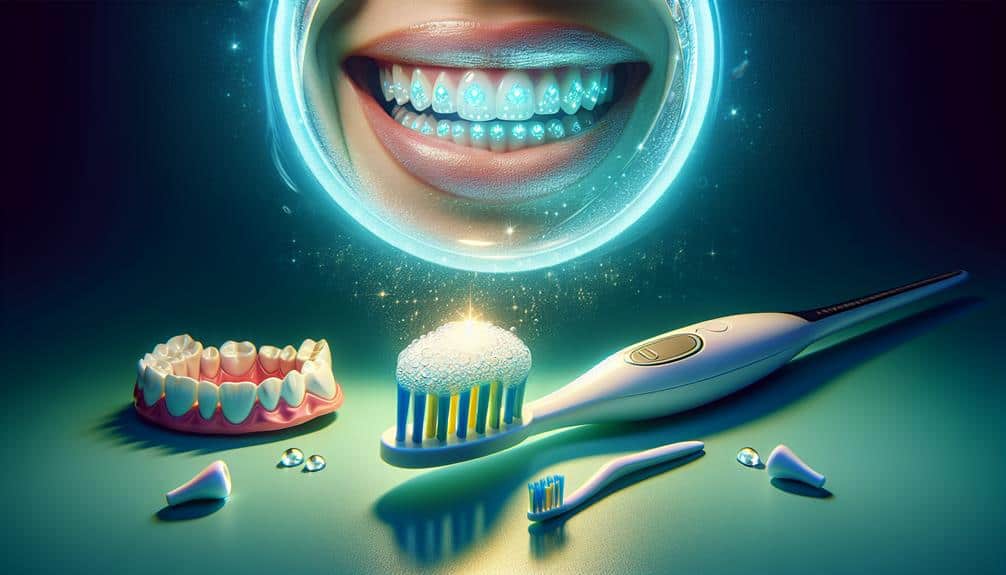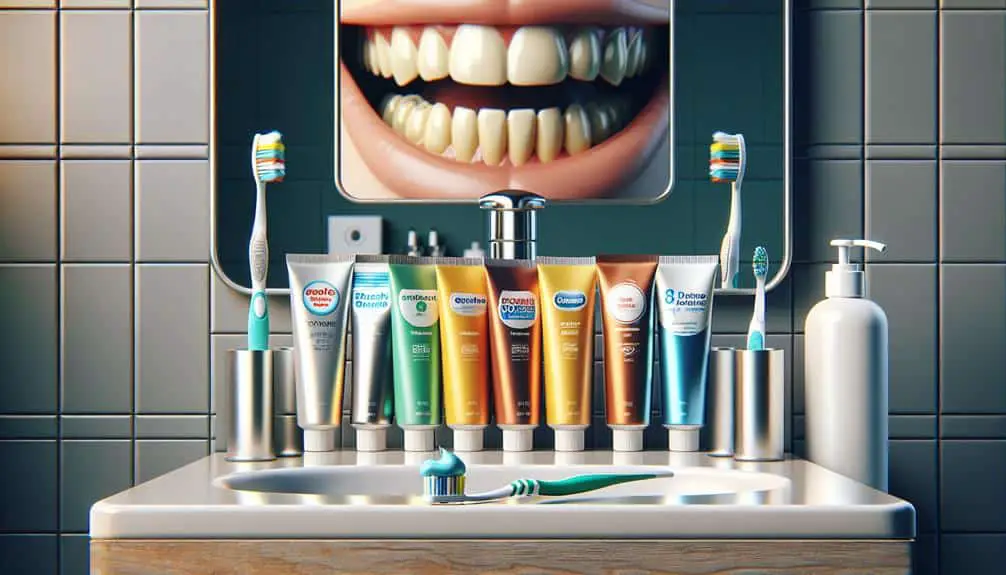You can enhance your smile by trying three effective hydrogen peroxide teeth whitening methods. Start by brushing with a properly diluted concentration of 1.5% or 3% for safe results. Consider using hydrogen peroxide mouthwash as a complementary whitening method that helps with oral hygiene. Finally, you can create a hydrogen peroxide and baking soda paste for removing surface stains, but be cautious about tooth sensitivity. These methods are simple to use and can greatly improve your teeth's appearance.
Key Points
- Dilute hydrogen peroxide for safe whitening.
- Consult a dentist before starting any method.
- Use sparingly to avoid enamel erosion.
- Follow safety precautions to prevent harm.
- Incorporate into oral care routine for brighter smile.
Brushing With Hydrogen Peroxide
For important teeth whitening results, consider incorporating brushing with hydrogen peroxide into your oral care routine. When using hydrogen peroxide for brushing, safety precautions must be followed to prevent any potential harm. It's essential to dilute the hydrogen peroxide properly to a safe concentration for oral use. A 1.5% or 3% solution is commonly recommended for oral hygiene purposes. Undiluted hydrogen peroxide can cause irritation and damage to the soft tissues in your mouth.
The frequency of using hydrogen peroxide for brushing is also vital. Experts suggest using it as a whitening agent no more than once or twice a week to avoid enamel erosion. Overusing hydrogen peroxide can lead to tooth sensitivity and other oral health issues. It's advisable to consult with your dentist before starting this whitening method to make sure it's suitable for your dental health.
Hydrogen Peroxide Mouthwash
To further enhance your oral care routine, consider incorporating hydrogen peroxide mouthwash as a complementary whitening method. Hydrogen peroxide mouthwash can be a valuable addition to your oral hygiene regimen due to its whitening benefits. This type of mouthwash contains a diluted form of hydrogen peroxide, which can help to whiten teeth by breaking down stains on the enamel surface.
When used correctly and in moderation, hydrogen peroxide mouthwash can be an effective tool for maintaining oral hygiene and promoting a brighter smile. It's crucial to follow the guidelines provided on the product label to guarantee safe usage. Typically, this involves diluting the hydrogen peroxide with water to reduce its concentration before swishing it around your mouth for a short period.
In addition to its whitening properties, hydrogen peroxide mouthwash can also help to eliminate harmful bacteria in the mouth, supporting overall oral health. Remember to consult with your dentist before incorporating any new whitening methods into your routine to confirm they're suitable for your teeth.
Hydrogen Peroxide and Baking Soda Paste
Consider combining hydrogen peroxide with baking soda to create a whitening paste for your teeth. This homemade remedy can be an effective way to brighten your smile. Here are some key points to keep in mind when using hydrogen peroxide and baking soda paste for teeth whitening:
- Effectiveness: The combination of hydrogen peroxide and baking soda can help remove surface stains on your teeth, making them appear whiter.
- Caution: While this method can be effective, it's crucial to use it sparingly. Overuse of hydrogen peroxide can lead to tooth sensitivity and gum irritation.
- Complement to Professional Treatments: Using this paste can be a cost-effective way to maintain the results of professional treatments or homemade whitening trays.
Frequently Asked Questions
Is It Safe to Use Hydrogen Peroxide for Teeth Whitening if I Have Sensitive Teeth?
If you have sensitive teeth, using hydrogen peroxide for teeth whitening may not be ideal. It could potentially worsen sensitivity and harm enamel health. Consider alternative solutions like gentle products specifically designed for sensitive teeth to achieve a brighter smile safely.
Can Hydrogen Peroxide Damage Tooth Enamel With Long-Term Use?
Persistently prolonged use of hydrogen peroxide can potentially harm your tooth enamel over time. Ensuring enamel protection is essential. Seek dental guidance for prolonged usage to prevent adverse long-term effects on your oral health.
How Often Should I Use Hydrogen Peroxide for Teeth Whitening to See Results?
For effective teeth whitening with hydrogen peroxide, use it 1-2 times weekly. Monitor sensitivity and discontinue if discomfort occurs. Results may vary, but you should see improvement within a few weeks. Remember to prioritize enamel safety.
Are There Any Side Effects or Risks Associated With Using Hydrogen Peroxide for Teeth Whitening?
When using hydrogen peroxide for teeth whitening, potential risks include gum irritation and tooth sensitivity. Precautions like proper dilution and limited usage can minimize these effects. Alternative methods like professional whitening may offer effectiveness with fewer risks.
Can Hydrogen Peroxide Be Used for Teeth Whitening on Dental Restorations Like Fillings or Crowns?
When whitening teeth with hydrogen peroxide, avoid applying it directly on dental restorations like crowns and fillings. These restorative materials may not whiten evenly and could be damaged. Consult your dentist for safe whitening options.
Conclusion
To wrap up, hydrogen peroxide can be an effective and affordable option for teeth whitening. Whether you choose to brush with it, use it as a mouthwash, or create a paste with baking soda, these methods can help brighten your smile.
But remember, moderation is key and it's always best to consult with your dentist before trying any new whitening methods. So, why not give hydrogen peroxide a try and see the results for yourself?



